Diarrhea in Dogs
Our Southeast Memphis vets see a lot of dogs suffering from diarrhea, and for a range of reasons.
Mild bouts of diarrhea are very common in dogs and can be caused by mild intestinal distress due to your dog eating a small amount of something that doesn't agree with them, such as table scraps, or just from the simple act of switching to a new brand or flavor of food.
That said, there are also a number of more serious reasons why your dog could have diarrhea.
What Causes Diarrhea in Dogs
Below are some of the most common reasons for diarrhea in dogs:
- Stress or anxiety
- Change in diet or treats
- Eating garbage or spoiled food
- Ingestion of foreign objects such as toys, bones and fabric
- Ingesting toxins or poisons
- Viral infections such as parvovirus, distemper or coronavirus
- Parasites - roundworms, hookworms, whipworms, Coccidia or Giardia
- Bacterial infections - such as salmonella
- Pancreatitis
- Inflammatory bowel disease
- Colitis
- Liver or kidney disease
- Intestinal cancer
- Medications such as antibiotics
But how do you know whether your dog's diarrhea requires a visit to the vet?
When To Contact Your Vet
If your dog has a single episode of diarrhea and is otherwise acting normal, it is likely not a cause for concern. Monitor your dog's bowel movements to see if things clear up. More than 2 episodes could indicate a problem, so it's a good idea to call your vet if your pooch has two or more bouts of diarrhea.
If your pup is straining to pass a stool but only passing small amounts of watery diarrhea, they could be experiencing a painful blockage due to the ingestion of a foreign object such as a toy. This is a very serious concern and needs veterinary attention right away, contact your vet or head to the nearest emergency animal hospital for care.
Recurring bouts of diarrhea over a short period of time could be a sign of a very serious health issue, particularly if your pup is very old, very young, or has a compromised immune system. Infections such as parvovirus are extremely serious, contagious and life-threatening. Contact your vet right away if your pooch is experiencing repeated episodes of diarrhea.
Dogs showing other symptoms as well as diarrhea should also be seen by a vet as soon as possible. If your dog has any of the following symptoms contact your vet right away to make an appointment:
- Blood in stool
- Unusual drooling
- Vomiting
- Lack of Appetite
- Weakness
- Signs of dehydration (Sunken dry-looking eyes, dry nose, or dry, sticky gums)
If your pooch is displaying any symptoms that cause you concern, contact your veterinarian. Your vet will let you know whether your pet's symptoms indicate that an examination is necessary.
How to Treat Diarrhea in Dogs
Never give your dog human medications without consulting your veterinarian. Many over-the-counter medications that work well for people can be toxic to dogs.
If your dog has had one or two runny or soft stools, you may want to give your dog some time to recover by simply fasting for 12 - 24 hours.
A bland diet for a day or two may help to resolve your pup's issue. Plain cooked white rice with a little chicken and some canned plain pumpkin (not pumpkin pie filling) may help to make your pup's tummy feel better. Once your pooch feels better gradually reintroduce their regular food.
Other things that might help to soothe your dog's upset tummy include natural yogurt, probiotics, peeled boiled potatoes, cottage cheese, egg with no oil added, specially formulated dog foods, and medications prescribed by your vet.
When it comes to your best buddy's health it is always best to err on the side of caution. By taking your pooch in for an examination you give your vet the opportunity to determine the underlying cause of your pup's diarrhea and recommend the most effective treatment.
If your dog has diarrhea, contact our Southeast Memphis vets to book an examination for your pooch. Our vets at Southwind Animal Hospital have experience in diagnosing and treating the causes of diarrhea in dogs.
Looking for a vet in Southeast Memphis?
We're always accepting new patients, so contact our veterinary hospital today to book your pet's first appointment.
Related Articles View All
How can a dog get rabies? What are the signs?
Rabies is a fatal, highly contagious, virus that can affect dogs, cats, livestock and humans! What are the signs your dog has rabies? What should you do? Read on to find out.
Signs that Your Dog May Have an Ear Infection
Dog ear infections need treatment quickly to prevent the condition from becoming more severe, or causing recurring infections in the future. So, how can you tell if your dog has an ear infection? Read on to find out.
How often should I take my dog to the vet?
Taking your dog to the vet regularly is a proactive way to help your pet live a long and healthy life, but how often should you take your dog to the vet? And, how can you save money on these routine appointments? Read on to find out.
Puppy Shots Schedule - When To Get Your Puppy Vaccinated
Vaccinations play an essential role in protecting your puppy's health in their first year of life. Here, you will find vital information about puppy vaccines and a schedule to help you plan for your puppy's shots.
Should I microchip my dog?
If your dog is lost or stolen, a microchip sitting under their skin can increase their chances of being returned to you. Not sure if you should get your four-legged friend microchipped? Below, we look at some of the reasons why many vets recommend microchipping for dogs.

